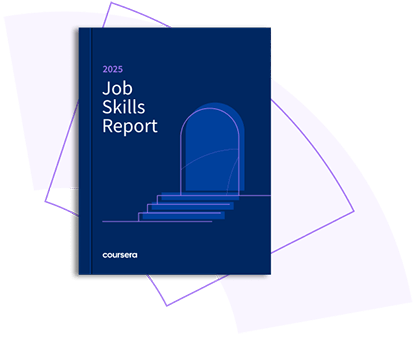Three Key Takeaways from the Top Job Skills in 2025 Webinar
Learn how to thrive in the evolving world of work with expert insights from the Coursera's Top Job Skills in 2025 webinar. This recap explores the critical skills needed for 2025 and beyond, from mastering GenAI to navigating cybersecurity threats.

The future of work is arriving faster than ever, demanding a workforce equipped to navigate unprecedented change. By 2030, employers anticipate a staggering 92 million jobs will be displaced, yet a remarkable 170 million new roles will emerge, all within the next six years.
This rapid evolution underscores a critical imperative: organizations must act now to close the widening skills gap. For the Top Job Skills in 2025 webinar, Coursera brought together experts from diverse sectors to share insights on how to navigate this challenging terrain in a discussion moderated by Coursera’s Senior Skills Transformation Manager, Nicole Amaral:
Diana Gehlhaus, Principal Federal Talent Management and Policy Strategist, MITRE
Sam Grayling, Insights Lead, World Economic Forum
Francesca Lockhart, University of Texas at Austin and Robert Strauss Center for International Security and Law, Professor and Cybersecurity Clinic Program Lead
David Porter, Sr. Director, Digital & Leadership Learning, Moderna
Note: See the Job Skills Report 2025 for more information on the trends shaping learning and work.
Here’s a look at some of the key takeaways from the discussion:
1. Upskilling and reskilling are essential for navigating GenAI transformation
The rise of generative AI demands a proactive response to upskilling and reskilling. In 2024, a staggering number of individuals—one every 10 seconds on Coursera—enrolled in GenAI courses, signaling a global recognition of the need to acquire these critical skills. With 77% of employers planning to upskill their workforce to better work alongside AI and new job creation on the horizon, the panelists discussed how organizations can equip their teams with the expertise needed to not only adapt to the GenAI revolution but to thrive in it.
Expert insights:
Sam Grayling, WEF: “The biggest barrier to business transformation right now is skills gaps…Two thirds of employers are expecting to hire more people for the right skills. Meanwhile, 40% are also reducing their workforce. So what that shows me at least, is that the importance of job transitions is going to be crucial because to find any of the talent, you're gonna have to look after what you've got now, and find ways to get them into the roles of the future as best as you possibly can.”
Diana Gehlhaus, MITRE: “The pace of advancement...is happening so much more rapidly than with previous general purpose technologies that I worry about the skills gap worsening for some people...We just don't have the time to hope that people figure it out on their own. We need to be more proactive about bringing workers along with us.”
David Porter, Moderna: “For some Gen AI is viewed as being too hard and taking too long to master...And my response to that is, that's not true...It's actually not impossible, or even that hard, to be what I would call a generative AI consumer, meaning someone who is able to exercise good prompting...All it really takes is a commitment to practicing and some guidance.”

Discover the fastest-growing skills across AI, data science, technology, and business, and see how learners are embracing AI-based learning tools to excel in the future of work.

2. AI-enabled threats and geoeconomic fragmentation are increasing urgency for cybersecurity skills
As organizations embrace generative AI, they are also grappling with a growing cybersecurity challenge. Nearly 90% of IT decision-makers acknowledge that GenAI will create an incredible amount of data that needs protection, but alarmingly, only 65% are backing up even half of that data. Furthermore, networks and cybersecurity ranked as the #2 skill expected to rise in the next 5 years and security management specialists among the top 5 fastest-growing roles. The panelists explored why developing robust cybersecurity skills is now more critical than ever for safeguarding data and maintaining operational resilience and what investments in cybersecurity skills development can look like.
Expert insights:
Sam Grayling, WEF: “For networks and cyber security, it's actually geoeconomic fragmentation which comes up as one of the key drivers. That's increasing demand for cyber security skills.”
Francesca Lockhart, UT Austin: “There's a lot of concern...around AI, enabling both a higher volume of cyber attacks and threats because of its speed and ability, as well as a faster evolution of cyber attacks and threats. Things like new malware, more refined phishing emails [could be] produced by malicious cyber threat actors...faster and better than ever.”
Francesca Lockhart, UT Austin: “Cyber has proliferated. It's such a multi-domain concept and field...whether you go on to be a cybersecurity incident responder or professional, or you go on to be a lawyer or journalist...just the basic understanding of how this stuff works...will impact you in your job, make you more successful, and give you cybersecurity literacy.”
3. Purpose-driven learning and skills-based development are key to helping individuals become more adaptable
As employers grapple with rapidly evolving technologies and shifting market demands, there's a growing recognition that prioritizing the "why" of learning is just as crucial as the "what." Evaluation of real-world work experience is the primary way employers are assessing skills according to WEF. This shift necessitates a move towards skills-based hiring, which is why 94% of leaders say micro credentials can strengthen career outcomes for students and talent development strategies that empower individuals to connect their learning to broader organizational goals. The panelists discussed how organizations can foster a culture of continuous growth, prioritize purpose-driven learning, and embrace skills-based hiring to future-proof their workforce and unlock their full potential.
Expert insights:
Francesca Lockhart, UT Austin: “Because these skills are so rapidly developing and best practices are changing often too fast for many traditional educational institutions and bodies to keep pace with. We have to prioritize skills-based hiring for these specific areas.”
David Porter, Moderna: “Make sure your people understand that the why is always more important than the what. That gives them the space and the resources to exercise that hunger for lifelong learning that we all have, but some of us have forgotten.”

The insights shared by the expert panel paint a clear picture: success in the evolving world of work hinges on proactive, strategic, and inclusive skills development. By embracing GenAI, prioritizing cybersecurity, and fostering a culture of purpose-driven learning, organizations can empower their workforce to adapt, innovate, and thrive in the years to come. The time to invest in skills is now, for a future where talent is the key differentiator.
This content has been made available for informational purposes only. Learners are advised to conduct additional research to ensure that courses and other credentials pursued meet their personal, professional, and financial goals.
